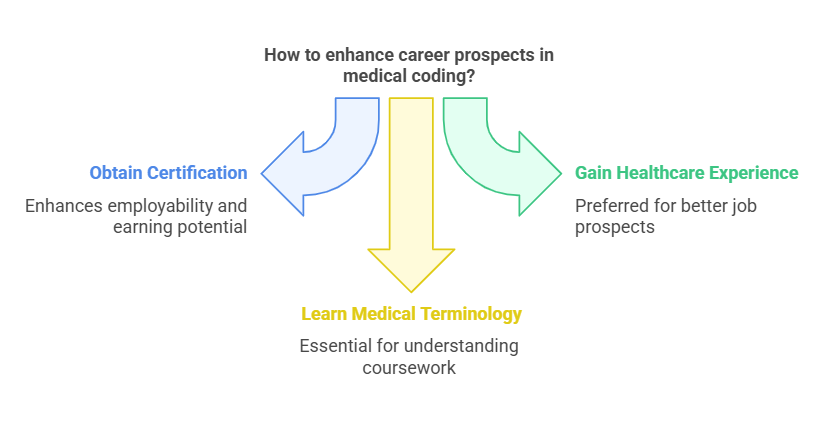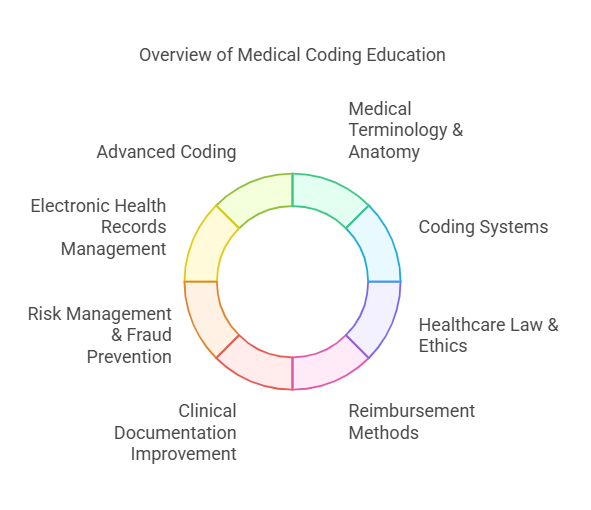Top Certified Coding Specialist Programs Online for Your Career Growth
Medical billing and coding are vital to healthcare, ensuring accurate documentation, insurance reimbursement, and financial standardization. Professionals in this field classify diseases and treatments using standardized codes, with roles divided between medical coders, who assign diagnosis and procedure codes, and medical billers, who handle insurance claims and payments. Certifications like the Certified Coding Associate (CCA) by AHIMA, along with CPC and CBCS, prepare individuals for various medical settings. With high demand and career growth opportunities, medical billing and coding offer stable prospects in the healthcare industry.

Career Opportunities for Medical Coding Specialists
Medical coding specialists play a crucial role in healthcare by ensuring accurate medical records and billing processes. This career path offers a variety of employment opportunities across multiple healthcare settings, including hospitals, private practices, and insurance companies.
According to the U.S. Bureau of Labor Statistics (BLS) 2025 projections, medical records and health information specialists, including medical coders, continue to experience above-average job growth due to increasing healthcare needs and regulatory requirements.
With experience, medical coding specialists can advance into leadership roles such as coding supervisor or health information manager. Additionally, professionals can transition into consulting, providing expertise to healthcare organizations looking to optimize coding practices and improve billing efficiency.
Some common career paths for medical coding specialists include:
Medical Biller – Focuses on submitting claims and securing reimbursements.
Health Information Manager – Oversees patient records and ensures data accuracy.
Risk Adjustment Coder – Specializes in coding related to chronic conditions and risk management.
Coding Supervisor or Manager – Leads a team of coders and ensures compliance with medical standards.
Healthcare Consultant – Advises healthcare facilities on coding efficiency and reimbursement strategies.

Prerequisites and Requirements for Medical Coding
Medical coding programs do not have strict prerequisites, making them accessible for those looking to enter the healthcare field quickly. However, most programs require a high school diploma or equivalent.
Some training programs may recommend or require:
Basic knowledge of medical terminology and anatomy (may be covered in coursework).
Previous healthcare experience (preferred but not always required).
Certification exams, such as CPC or CCS, for better job prospects and career advancement.
While certification is not always mandatory, it is highly recommended to enhance employability and earning potential.

Top Online Medical Coding Programs (2025 Edition)
When selecting an online medical coding program, it’s essential to look for accreditation from reputable organizations like:
American Academy of Professional Coders (AAPC)
American Health Information Management Association (AHIMA)
A strong medical coding program should offer:
Comprehensive certification preparation (e.g., CPC, CCS).
Courses covering medical terminology, anatomy, and coding procedures.
Experienced instructors with healthcare industry backgrounds.
Job placement assistance and career services.
Popular online programs for 2025 include:
AAPC’s Online CPC Training – Offers industry-recognized training for certification.
AHIMA’s Coding Basics – Covers medical coding fundamentals for beginners.
Purdue University Global’s Medical Billing & Coding Certificate – Includes in-depth training with financial aid options.
University of Cincinnati Online’s Medical Coding Certificate – Features interactive learning modules and flexible scheduling.

Medical Coding Curriculum and Coursework
Medical coding programs typically cover the following essential subjects:
Medical Terminology & Anatomy – Understanding body systems and common diagnoses.
Coding Systems – Training in CPT, HCPCS, ICD-10-CM, and ICD-10-PCS coding manuals.
Healthcare Law & Ethics – Understanding HIPAA regulations and compliance.
Reimbursement Methods – Learning about insurance claims and payment processes.
Clinical Documentation Improvement – Enhancing coding accuracy and reducing claim denials.
Some specialized programs also offer courses in:
Risk Management & Fraud Prevention
Electronic Health Records (EHR) Management
Advanced Coding for Inpatient and Outpatient Services

Tuition and Financing Options
The cost of medical coding programs varies based on institution and program length, ranging from $2,000 to $10,000. Many programs provide:
Flexible payment plans to ease financial burdens.
Scholarships and grants for qualifying students.
Federal financial aid options for accredited institutions.
Money-back guarantees or job placement assistance.
Prospective students should compare programs carefully and explore financing options to ensure affordability.
The Role of a Medical Coder
Medical coders translate medical diagnoses and procedures into standardized codes, using:
ICD-10-CM (Diagnosis Codes)
CPT (Procedural Codes)
HCPCS (Additional Healthcare Services Codes)
Successful medical coders must possess:
Strong analytical skills to ensure accurate coding.
Attention to detail to prevent billing errors and claim denials.
Communication skills to interact with healthcare professionals and insurers.
This profession is vital in healthcare reimbursement and patient care documentation.
6 Lesser-Known Facts About Medical Coding
Remote Work Opportunities: Many medical coders work from home, offering flexible work schedules.
Indeed lists over 2,300 remote risk adjustment coder positions.
indeed.com
AI and Automation in Coding: Emerging AI tools assist coders but cannot fully replace human expertise.
While specific studies are not cited here, AI's role in augmenting but not replacing human coders is a recognized trend in the industry.
Growing Demand for Risk Adjustment Coders: As healthcare costs rise, accurate coding for chronic conditions becomes increasingly important.
Job postings for risk adjustment coders have surged, reflecting heightened demand.
indeed.com
Medical Coding Isn't Just for Hospitals: Coders also work for insurance companies, government agencies, and legal firms.
Various job listings show coders working across multiple sectors beyond hospitals.
indeed.com
Medical Coders Can Earn Up to Six Figures: With experience and specialty certifications, top earners surpass $100,000 annually.
ZipRecruiter provides estimates for remote risk adjustment coder salaries, with some positions offering up to $42/hr, translating to over $87,000 annually.
ziprecruiter.com
Continuing Education is Crucial: Coding guidelines frequently change, requiring coders to stay updated with ongoing training.
The AAPC emphasizes the importance of continuous education for medical coders to keep abreast of evolving guidelines.
jobs.aapc.com
FAQs About Medical Coding (2025 Edition)
-
Medical coders translate medical procedures into codes, while medical billers handle insurance claims and payments.
-
Most medical coding programs take 6 months to 1 year to complete. Certification preparation may add a few extra months.
-
The most recognized certifications include:
Certified Professional Coder (CPC) – AAPC
Certified Coding Specialist (CCS) – AHIMA
Certified Billing and Coding Specialist (CBCS) – NHA
-
Yes! Many healthcare providers and insurance companies offer remote medical coding positions.
-
According to the BLS 2025 data, the average salary for medical coders is $58,000 per year, with top earners making over $85,000.
Conclusion: Exploring Career Paths in Medical Billing and Coding
Medical billing and coding remain high-demand careers with excellent growth potential. Whether you are entering the field or looking for career advancement, online coding programs provide the necessary training to secure employment and achieve industry-recognized medical billing and coding certification. At AMBCI, we offer comprehensive courses that equip you with the skills and knowledge to excel in the industry and open doors to exciting career opportunities.
To get started:
Research accredited programs that align with your career goals.
Consider certification options for better job prospects.
Stay updated with coding regulations and industry advancements.
With the right training, medical coding specialists can build a stable and rewarding career in healthcare!
